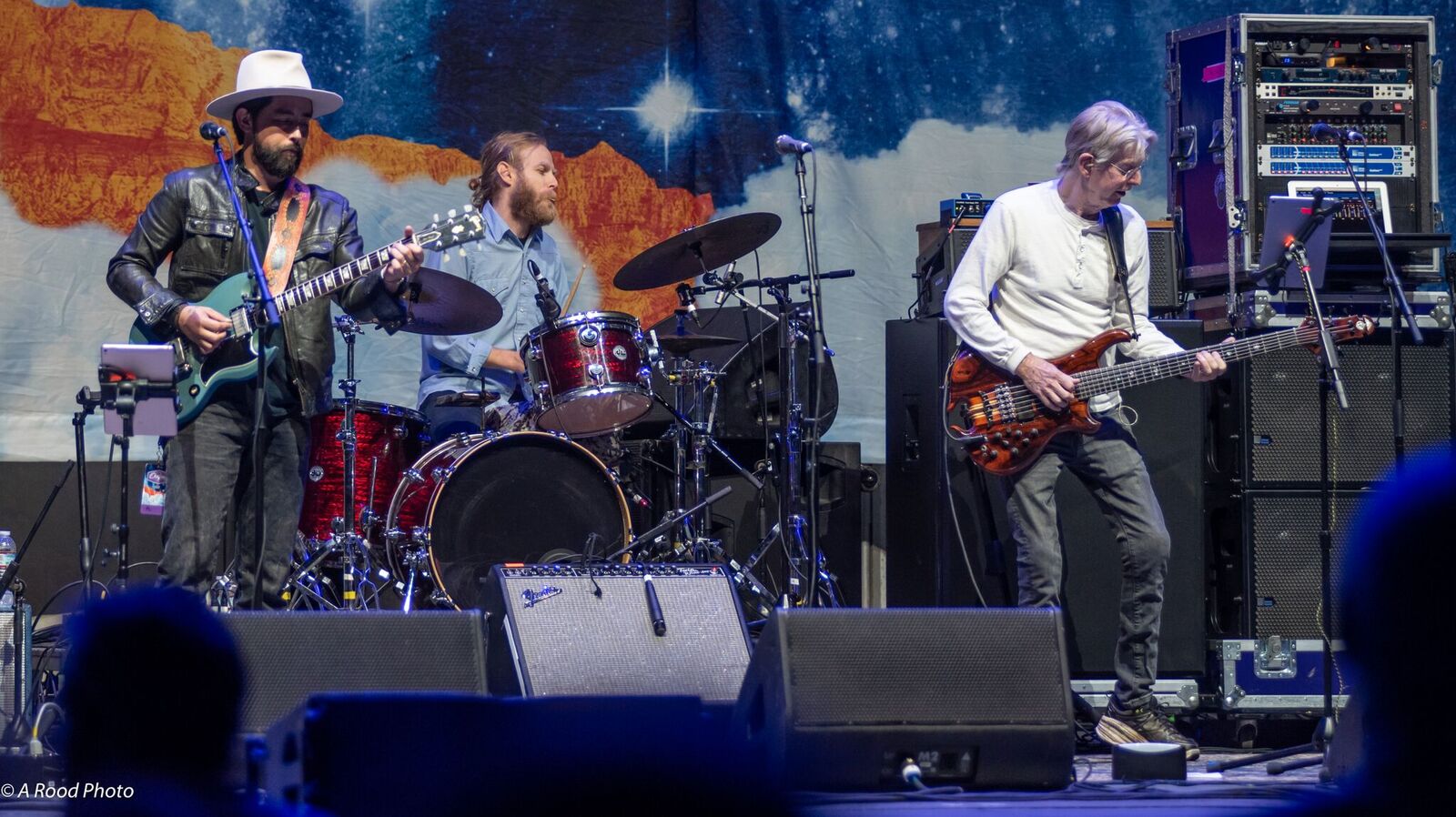The Outlaw Music Festival at the Hollywood Bowl

Photo by Steve Rood
The theoretical tie that bound together the five performances preceding the headliner during the Outlaw Music Festival’s stop at the Hollywood Bowl was each artist’s connection to the night’s outlaw-in-chief, Willie Nelson. Yet, within those sets, on this, the last night of the tour, were plenty of hat tips to some other boundary busters that, too, would’ve met the approval of the host. Even Nelson, himself, put on an hour-long culminating appearance, landing just minutes shy of the Sunday curfew, that had its share of call-outs to the Texan’s past co-conspirators.
Just before dusk, Micah Nelson and his band Particle Kid launched the show with a surreal offering utilizing industrial-strength fans, a red-helmeted “roadie,” and a fistful of angst-ridden songs accentuated by crashing guitar tones worthy of Neil Young and a smashed acoustic worthy of Pete Townshend. If there was anyone in the Bowl expecting serenity under the October stars, Particle Kid blew that to dust.
Micah’s brother, Lukas, and his band, Promise of the Real, were next, with a bit more of a conventional run of country-rock. Forlorn numbers like “Die Alone” or “Forget About Georgia,” citing an ex-flame and the Ray Charles’ ode to the Peach State as inspirations, rolled along with a newer Lady Gaga collaboration, “Find Yourself,” and a parting reminder to go see A Star is Born to which Lukas contributed a number of songs.
Margo Price followed on the revolving Bowl stage, jumping from sweet and sassy front woman in a yellow dress, to pounding on drums, and taking a solo spot at the keyboard. Proud to be the lone female on the bill, Price paid her homage to some talented trailblazing ladies, taking on Jessi Colter’s “Maybe You Should’ve Been Listening,” and closing with Dolly Parton’s “9-to-5,” with swinging swagger.
For those familiar with Sturgill Simpson’s brand of country, well, the singer-guitarist dropped a cherry-bomb on those preconceptions. Brandishing a number of Telecasters and leading his power quartet, Simpson proceeded to access much of the country/soul repertoire from his album-of-the-year Grammy nominee, A Sailor’s Guide to Earth, and turn it into a jamband manifesto. With overdriven, delay-pedal joy, the new father for a third time mentioned this would be his last appearance for a while, to go home and be dad again, but hinted maybe this is what’s coming in 2019 as he referenced Jimi Hendrix within one of several stretched-out guitar blitzes, and shredded beautifully on the Jeff Beck Group’s “Going Down.”
On the penultimate set of the schedule, Phil Lesh and Friends made their only Outlaw Fest tour appearance. Flanked by guitarists Jackie Greene and Cris Jacobs, the Grateful Dead bassist worked through a collection of classic Dead numbers starting with a comfortable “Althea,” into a lively “New Minglewood Blues.” Lesh was rather content to play his part, wearing a perma-grin, letting Greene and Jacobs handle the vocals. When he did take a verse, though, on “Brown-Eyed Women,” the legion of Lesh fans among the Bowl’s near-capacity crowd erupted approvingly. The Friends turned “Candyman” into a country shuffle, and generally kept everything else at a healthy clip, including “China Cat Sunflower” and a “Shakedown Street,” that keyboardist Jason Crosby colored beautifully, and dissolved a bit before resurging, sliding into “Viola Lee Blues.” Jacobs shined on a rollicking “Sugaree,” with Lesh inviting Margo Price back for a shake-up of Bobby Bland’s “Turn on Your Lovelight.”
Finally, the patriarch of the Outlaw legacy, wearing a Justin Turner Dodgers jersey, strolled out to an ovation. “How ‘bout them Dodgers!” Willie shouted, grabbing Trigger, his resilient Martin acoustic, and counting in “Whiskey River.” Backed by a band that mixed the youth of sons Micah and Lukas with his sister Bobbie, and veterans like Mickey Raphael and Paul English, the red-headed stranger sounded as ornery as ever on “Mamma Don’t Let Your Babies Grow Up to be Cowboys” yet still could deliver the sentiment on slower entries, “Angel Flying Too Close to the Ground” and “Always on My Mind.” He also gave his nods to old friends no longer with us: “Good Hearted Woman” for Waylon Jennings; “It’s All Going to Pot,” for Merle Haggard; and a foursome of Hank Williams gems including the show’s finale, “I Saw the Light,” that welcomed back Price and Lesh one last time.
With six artists spread over six hours, and intermissions rendered merely as quick rotations of a stage, the Outlaw Music Festival kept the emphasis on the music and the outlaws, closing out this creatively ambitious summer tour with a final Autumn evening in the Wild West.



















